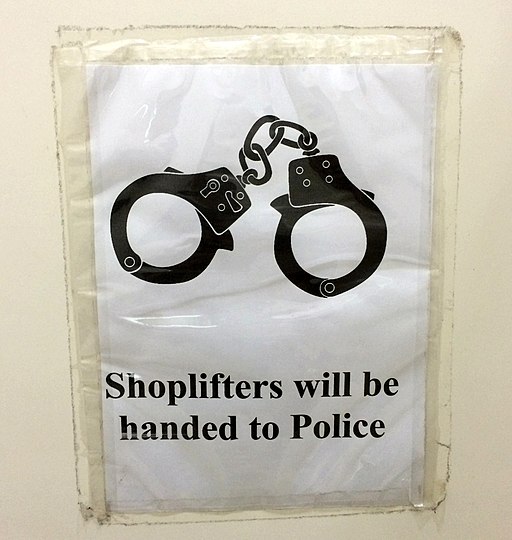Robbery involves the use of force or threat to steal from a person or place, while shoplifting is stealing items from a store without force or threat.
TL;DR Robbery Vs. Shoplifting
Shoplifting refers to the act of stealing merchandise from a store without using force or threats. It is typically considered a less severe offense compared to robbery. Shoplifters often aim to avoid detection and escape unnoticed with their stolen goods.
Robbery involves using force or intimidation to unlawfully take another person’s belongings directly from their possession. Robbery is a violent crime that can have serious consequences for both the victim and the perpetrator.
What is shoplifting?

Shoplifting, often referred to as the “five-finger discount,” is a form of theft that occurs when someone unlawfully takes merchandise from a store without paying for it. It may seem like a victimless crime, but in reality, it has serious consequences. Shoplifters typically target small items that are easy to conceal or quickly grab and run with.
There are various methods employed by shoplifters to carry out their illicit activities. Some may stash stolen goods in their bags or clothing, while others might use distraction techniques to divert the attention of store employees. In some cases, shoplifters even resort to tools like magnetic detachers or booster bags designed to bypass security measures.
The motivations behind shoplifting can vary widely. Some individuals steal out of necessity due to financial hardships or personal circumstances, while others do it for the thrill or adrenaline rush. Regardless of the reasons behind this act, shoplifting remains illegal and punishable by law.
Retailers invest significant resources in preventing and combating shoplifting incidents. They employ surveillance cameras strategically placed throughout stores and hire loss prevention personnel trained to identify suspicious behaviors and apprehend offenders discreetly.
While each jurisdiction has its own laws regarding shoplifting penalties, common consequences include fines, community service hours, probationary periods, mandatory anti-theft education programs, and even jail time for repeat offenders.
What is robbery?

Robbery is a crime that involves taking someone’s property through the use of force or intimidation. It is typically carried out by individuals who have the intention to deprive another person of their belongings.
Unlike shoplifting, which is stealing merchandise from a store without directly threatening anyone, robbery involves direct confrontation and coercion. The robber may brandish a weapon or use physical force to intimidate their victims into surrendering their valuables.
One key element that sets robbery apart from other crimes is the presence of violence or threat. It instills fear in both its victims and society as a whole, making it an offense taken very seriously by law enforcement agencies.
The consequences for committing robbery are severe and can vary depending on factors such as the severity of violence used, any injuries sustained during the act, and previous criminal records. Offenders can face imprisonment, hefty fines, probation, or even parole restrictions upon release.
Robbery Vs. Shoplifting – Key differences
| Aspect | Robbery | Shoplifting |
|---|---|---|
| Definition | The act of stealing from a person or place through the use of force, violence, or the threat of harm. | The act of stealing merchandise from a store without the use of force or violence. |
| Force or Threat | Involves the use of physical force, intimidation, or threats to take property or money from victims or businesses. | Typically does not involve the use of force, threat, or violence against store personnel or other shoppers. |
| Targets | Can target individuals, businesses, banks, or other locations with the intent to take money, belongings, or valuables. | Primarily targets retail stores, aiming to steal items available for purchase, such as clothing, electronics, or groceries. |
| Legal Consequences | Considered a serious criminal offense with potential for severe penalties, including imprisonment. | Often treated as a misdemeanor or lesser offense, with penalties that may include fines, probation, or community service. |
| Nature of Crime | Typically a violent crime involving a direct confrontation with victims, often resulting in trauma or physical harm. | Non-violent property crime that is generally characterized by stealth and secrecy, causing minimal harm to individuals. |
| Intent | The primary intent is to forcibly take property or money from the victim or location. | The primary intent is to steal merchandise without causing physical harm to anyone. |
| Examples | Armed bank robbery, mugging, home invasion, carjacking. | Concealing merchandise in clothing, bags, or pockets, then leaving the store without paying. |
Consequences for Committing Robbery or Shoplifting
Consequences for committing robbery and shoplifting can vary based on the jurisdiction, the specific circumstances of the crime, and the criminal history of the offender. Here are some general consequences associated with each:
Robbery
- Criminal Charges: Robbery is typically classified as a felony, and individuals convicted of robbery may face serious criminal charges.
- Prison Time: Conviction for robbery can result in substantial prison sentences, often several years or more, depending on factors such as the use of weapons, injuries to victims, or prior convictions.
- Fines: Offenders may be required to pay fines in addition to serving a prison sentence or probation.
- Restitution: Courts may order convicted robbers to pay restitution to their victims to compensate for any financial losses or medical expenses incurred as a result of the crime.
- Probation: In some cases, individuals convicted of robbery may be placed on probation, which includes regular check-ins with a probation officer and adherence to specific conditions.
Criminal Record: A robbery conviction can result in a permanent criminal record, which can have long-term consequences, such as difficulty finding employment or housing.
Shoplifting
- Criminal Charges: Shoplifting is often treated as a misdemeanor or a less serious offense, especially for first-time offenders.
- Fines: Convicted shoplifters may be required to pay fines, typically in proportion to the value of the stolen items.
- Probation: Instead of or in addition to fines, individuals may be placed on probation for a specified period. Probation can include community service, mandatory theft prevention classes, or regular check-ins with a probation officer.
- Civil Penalties: In some cases, shoplifters may face civil penalties in the form of civil lawsuits filed by retailers seeking damages for stolen merchandise or security costs.
- Criminal Record: A shoplifting conviction can result in a criminal record, which may affect future employment and personal opportunities, but the impact is generally less severe than that of a robbery conviction.
It’s important to note that legal consequences can vary significantly from one jurisdiction to another and depend on the specific laws and regulations in place. Additionally, rehabilitation programs and diversion programs may be available for certain shoplifting offenders, especially for those with no prior criminal history.
For both robbery and shoplifting, it is essential to consult with an attorney for guidance on the specific legal processes and potential consequences in a given area.
Image Credits
Featured Image By – Vince Little, The Bayonet, Public domain, via Wikimedia Commons
Image 1 By – User:Katangais, CC BY-SA 3.0 , via Wikimedia Commons
Image 2 By – Ralph from Pixabay








